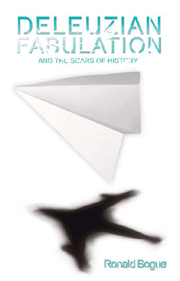Book contents
- Frontmatter
- Contents
- Acknowledgements
- Introduction
- 1 The Concept of Fabulation
- 2 Becoming-Prophet: Zakes Mda's The Heart of Redness
- 3 Becoming-Child, Becoming-Untouchable: Arundhati Roy's The God of Small Things
- 4 Becoming-Memory: Roberto Bolaño's Amulet
- 5 Becoming-Woman, Becoming-Girl: Assia Djebar's So Vast the Prison
- 6 Becoming-Fish: Richard Flanagan's Gould's Book of Fish
- Conclusion
- Bibliography
- Index
- Miscellaneous Endmatter
Introduction
Published online by Cambridge University Press: 12 September 2012
- Frontmatter
- Contents
- Acknowledgements
- Introduction
- 1 The Concept of Fabulation
- 2 Becoming-Prophet: Zakes Mda's The Heart of Redness
- 3 Becoming-Child, Becoming-Untouchable: Arundhati Roy's The God of Small Things
- 4 Becoming-Memory: Roberto Bolaño's Amulet
- 5 Becoming-Woman, Becoming-Girl: Assia Djebar's So Vast the Prison
- 6 Becoming-Fish: Richard Flanagan's Gould's Book of Fish
- Conclusion
- Bibliography
- Index
- Miscellaneous Endmatter
Summary
For the last twenty-five years, I have been studying the philosophy of Gilles Deleuze. In an initial effort, when Deleuze was not as well known as he is today, I tried to provide a general introduction to his thought and that of his frequent collaborator, Félix Guattari. In a subsequent series of books, I offered an assessment of the relevance of Deleuze and Deleuze-Guattari for understanding the arts, especially those of music, painting, cinema and literature. In the course of these investigations, I gradually became aware of a faint yet persistent anti-narrative strain in Deleuze's thought, or at least a predilection for disruptions of conventional narrative and a valorisation of the visual image over the verbal story. This struck me as odd, since Deleuze wrote three brilliant books on creative writers (Proust, Sacher-Masoch, Kafka) and frequently discussed works of literature, many of which have a strong narrative component. I pursued this question further in essays devoted to the concept of fabulation, the vague outlines of which Deleuze articulated late in his career, and after that inquiry, I felt convinced that Deleuze could be of little assistance in the analysis of the properly narrative aspect of literature.
- Type
- Chapter
- Information
- Deleuzian Fabulation and the Scars of History , pp. 1 - 13Publisher: Edinburgh University PressPrint publication year: 2010



